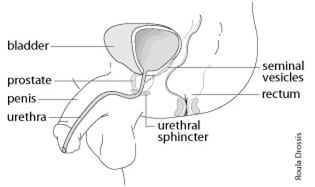
The prostate is a gland wrapped around the male urethra, the urine channel between the bladder and its control muscle, the urethral sphincter. Its main function is to produce part of the semen ejaculated at male orgasm. Each vas deferens carrying sperm from the testicle connects to the prostate. The nerves carried signals to produce erections run on either side of the prostate.

Prostate specific antigen (PSA) is an enzyme that is produced by cells of the prostate gland and contributes to the function of the semen. Under normal circumstances, a small amount of this substance is released from the prostate into the blood stream. As a result, this can be easily measured by means of an ordinary blood test. However, the level can change depending on a variety of factors, including the patient's race, age, prostate size and the presence of various diseases within the prostate.
Over the last 2 decades, PSA has become an invaluable tool to help diagnose patients with prostate cancer and to follow their treatment results. Originally, if the PSA value was greater than 4.0 ng/mL, the patient would likely be investigated to rule out cancer of the prostate. As researchers fine tuned the test and its application to help diagnose prostate cancer, PSA's utility improved. The purpose was to decrease the number of unnecessary investigations, while still investigating appropriate patients. Ultimately, this could lessen the over-diagnosis and over-treatment of this common disease, whereas at the same time, continue to diagnose significant disease burden.
Several modifications, which include changing the cut off values according to patient's age, i.e. age-specific PSA levels were used. Instead of an absolute value of 4.0 ng/mL as being suspicious of prostate cancer for all men, different PSA values could be used for different aged men. For example, a level of 2.5 ng/mL, in a younger man could be the threshold for investigating. Whereas, a gentleman in his seventh decade may have a threshold level of 6.5 ng/mL for investigations.
As well, the change in the absolute value over time may increase the accuracy of the test in diagnosing prostate cancer. This is known as the PSA velocity. If the patient's PSA value increases too quickly over a given period of time, this could increase the suspicion of prostate cancer. If infection or another noncancerous cause of rapid rate of change in the PSA is not present, the physician may institute further testing.
Another way to increase the accuracy of PSA in screening men for prostate cancer is the free/total ratio of PSA. The free/total PSA ratio is calculated based on the amount of PSA that is bound to proteins in the blood stream. A lower free/total PSA ratio will result in a potentially higher risk of prostate cancer. This test is most valuable in patients with a slightly elevated PSA, between 4 and 10. As well, PSA density can be used to make the test more accurate. It is determined by dividing the PSA by the volume of the prostate. Larger prostate glands can result in higher PSA levels without necessarily signifying the presence of cancer. These values may help the physician decide with greater certainty if further investigations are required to rule out cancer.
PSA screening for prostate cancer is controversial. Even with elevated PSA counts, this does not necessarily mean that you have prostate cancer although you may have an increased risk. Even with low PSA levels, there is a chance prostate cancer may be present.
If your PSA level is considered elevated, your physician may recommend a prostate ultrasound and prostate biopsy. Prostate biopsy can occasionally have serious side effects including bleeding and infection. If prostate cancer is found on the biopsy, this may lead to further treatments including radiation or surgery. Not all prostate cancers are the same and some grow slowly while others grow quickly and may spread.
Treatment of rapidly growing cancers is important. However, the benefit of treatment to slowly growing prostate cancers may be minimal and these treatments do have side effects that affect your quality of life. Many doctors feel that PSA screening is only beneficial for men with a life expectancy greater than 10 years. As well, men with higher risk (family history, ethnicity) of prostate cancer may benefit from earlier PSA tests. Other factors need to be taken into consideration including digital rectal exam to determine your risk of prostate cancer and the possible benefits of getting a PSA test. It is important to discuss the pros and cons with your physician about PSA testing.
Perhaps the most beneficial use of the PSA blood test is to follow patients after the diagnosis or treatment of prostate cancer. PSA is useful in monitoring patients who have chosen active surveillance for their prostate cancer. Active surveillance involves close observation of patients with an option for treatment at a later date. If the cancer appears to grow or if the patient wishes, then radiation or surgery could be considered.
Active surveillance involves routine use of PSA at regular intervals along with a physical examination. If you have surgery or radiation for prostate cancer, your PSA value will be followed at regular intervals. If the value remains very low after surgery or radiation, this would likely signify no evidence of recurrent cancer. However, if the PSA value does not decrease to appropriate levels after treatment or if it does not remain low, this may indicate recurrent cancer. The treating physician may then investigate this further.
If your prostate cancer is being treated with hormone therapy, frequent PSA measurements are also useful. The PSA blood test results, along with your physical examination and symptoms, can determine your response to the treatment. Your physician may use this information to tailor your cancer therapy.